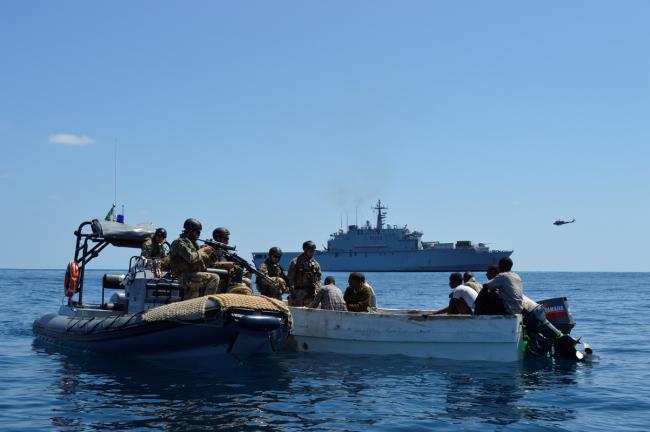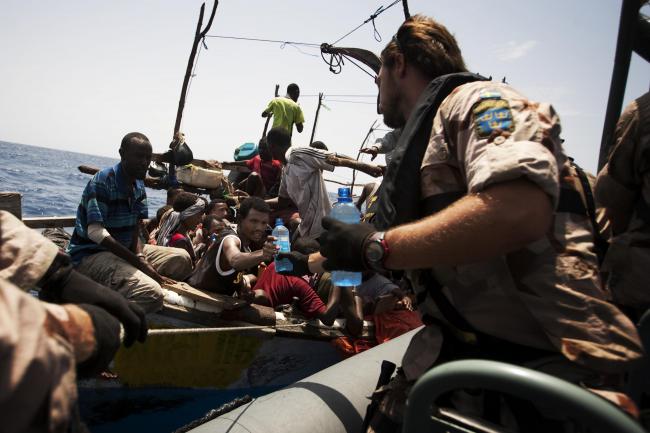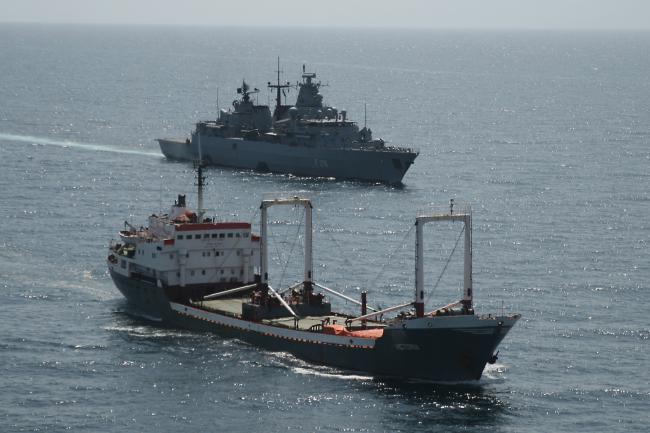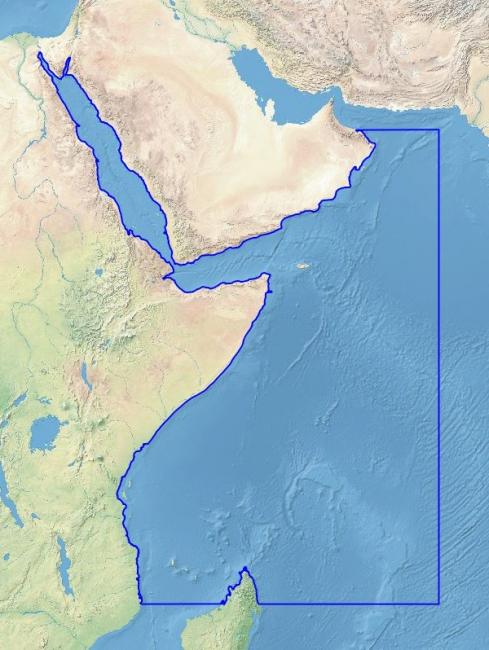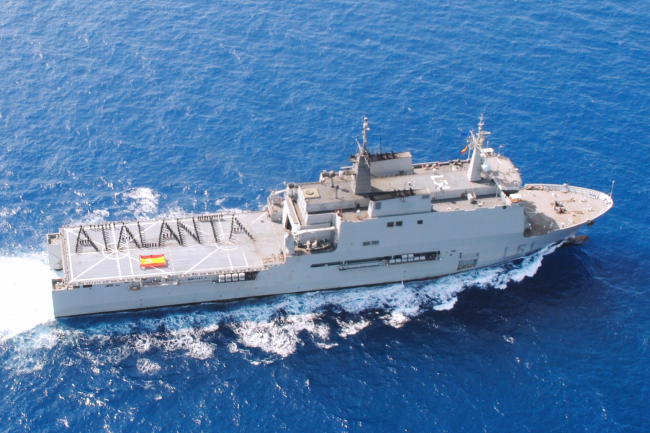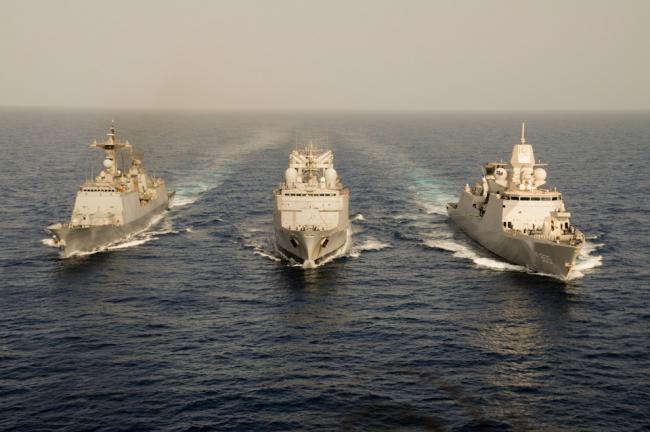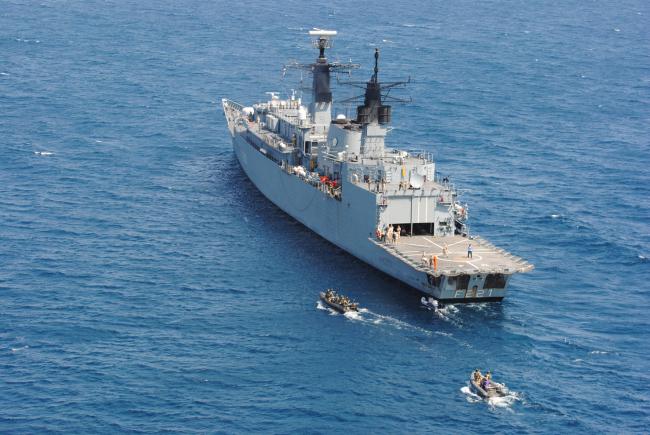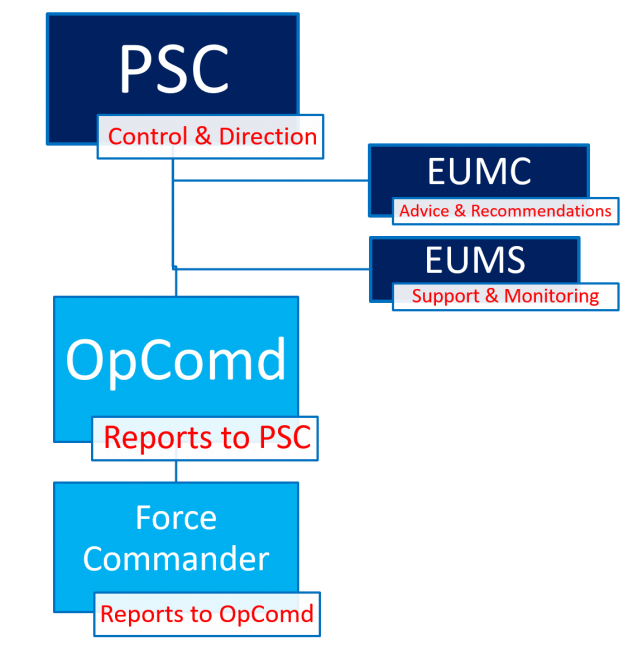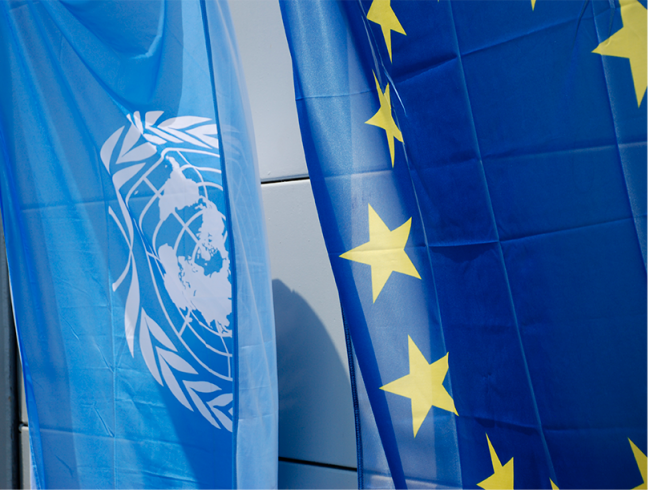In late 2022, EUNAVFOR Operation ATALANTA was extended towards December 2024 with a new mandate enforced, reflecting achievements, challenges and way ahead for the Operation. EU Member States decided that the Operation should preserve its main efforts to protect World Food Programme (WFP) and other vulnerable vessels; deter, prevent and repress piracy and armed robbery at sea; monitor fishing activities in the Horn of Africa and the Western Indian Ocean; combat drug trafficking and contribute to the arms embargo on Somalia, the illicit trade in charcoal and illegal, unreported and unregulated (IUU) fishing.
With ATALANTA being an integral part of the EU´s approach to the Horn of Africa, the Operation supports its sister missions EUCAP-Somalia and EUTM-Somalia, maintains close linkages with EU representations across the area and contributes to the implementation of EU programmes aimed to enhance the regional maritime security architecture.
Additionally, the new mandate expressed the will of establishing a new enhanced relation with EMASOH-AGENOR, by way of developing further links and synergies with this European-led operation in the Strait of Hormuz.
Indeed, the new mandate sets the goal to turn ATALANTA into a reference in the whole North Western Indian Ocean as a Maritime Security Provider.
In late 2008, the Council of the European Union adopted Joint Action 2008/851/CFSP, based on various UN resolutions, to establish the executive Common Security and Defense Policy (EU CSDP) – Operation ATALANTA and contribute to the deterrence, prevention and repression of acts of piracy and armed robbery off the Somali coast. Over time, the mandate of EUNAVFOR has been adapted to reflect the evolving situation at sea and the increased presence of the International Community in Somalia in order to become the Operation in a Maritime Security Provider in the North Western Indian Ocean.
On 12 December 2022, Council Decision (CFSP) 2022/2441 amended ATALANTA's tasks as follows:
a. Executive tasks:
- PROTECT World Food Program and other Vulnerable Shipping;
- DETER, PREVENT and REPRESS piracy and armed robbery at sea in the Area of Operation;
- CONTRIBUTE to the DISRUPTION of drug trafficking and weapons trafficking.
b. Non-executive tasks:
- CONTRIBUTE to the monitoring of narcotics drugs trafficking, weapons trafficking, suspected IUU fishing and charcoal illicit trade in the Area of Operation within existing means and capabilities;
- CONTRIBUTE to the EU integrated approach to Somalia and the relevant activities of the international community, helping to address the root causes of piracy and its network, upon request and within existing means and capabilities;
- SUPPORT other EU missions, programs and instruments in Somalia within existing means and capabilities. In particular coordinated closely with EUTM Somalia, EUCAP Somalia and Coordinated Maritime Presences in the North Western Indian Ocean;
- SUPPORT the promotion of the overall regional maritime security architecture, the relevant programmes implemented by the Commission within existing means and capabilities and to reinforce the already developed links with the Regional Maritime Information Fusion Centre in Madagascar and the Regional Operational Coordination Centre in Seychelles;
- COOPERATE with operation AGENOR and develop further synergies with European-led Maritime Situation Awareness in the Strait of Hormuz within its means and capabilities and the limits of this new mandate.
Data collated since 2008 demonstrate that EUNAVFOR, in co-operation with her counter-piracy partners, has become highly effective in preventing attacks before they happen.
Taken together, intelligence-led operations, a robust and proactive stance, as well as the continued effort to impress upon the maritime industry and the merchant community the importance of self-protection measures, have decreased the success rate of those attacks which are mounted.
At the height of piracy in January 2011, 736 hostages and 32 ships were being held by pirates. Since its launch in 2008 as first EU naval operation, EUNAVFOR ATALANTA:
- Holds a 100% success rate in protecting WFP vessels delivering humanitarian aid to internally displaced and refugees in Somalia;
- Ensures the protection of vulnerable vessels within the Area of Operations;
- Deters, prevents and represses acts of piracy and armed robbery at sea off the coast of Somalia;
- Cooperates and responds to illicit maritime flows, including illicit trade financing terrorism;
- Supports the EU Integrated Approach for Somalia and the Horn of Africa together with its two EU sister missions, EUCAP Somalia and EU TM Somalia, the EU Delegation to Somalia and EU Special Representative to the Horn of Africa;
- Acts as a fundamental tool in the EU’s Naval Diplomacy for the Indo-Pacific;
- Cooperates and supports all international organisations, naval forces and independent deployers present in the Area of Operations, as CMF and EMASOH;
Provides a unique legal framework to transfer pirates to regional states for their prosecution.
Moreover, EUNAVFOR has conducted and supported numerous Safety of Life at Sea (SOLAS) rescue missions in the area, helping local, regional and international trading and fishing vessels in distress.
The EUNAVFOR ATALANTA Area of Operations – AOO, according with the new mandate, includes (figure):
- Gulf of Aden and neighbouring countries , including the port and city of Muscat (Oman);
- Somali Basin;
- The Red Sea;
- Gulf of Suez;
- Gulf of Aqaba;
Within the Area of Operations, EUNAVFOR units conduct tasks in accordance with the Mandate. Close co-operation with WFP ensures that no vessel transporting humanitarian aid will travel unprotected in the Area of Operations.
EUNAVFOR assets also conduct patrols in the Internationally Recommended Transit Corridor (IRTC) in the Gulf of Aden and the Indian Ocean.
Furthermore, warships and Maritime Patrol and Reconnaissance Aircraft (MPRA) conduct reconnaissance and surveillance operations. Warships and their boarding teams routinely conduct visual or physical checks of vessels transiting the Area of Operations.
Meetings with local seafarers, or ‘friendly approaches’, are conducted to gather a better understanding of maritime practices by talking with the crews of fishing and trading vessels in the region and to make ships’ masters aware of the BMP 5 and register with Maritime Security Centre Horn of Africa (MSCHOA)'s voluntary registration scheme (VRS), as the best way to ensure the security of navigation and immediate assistance in case of need.
In addition, EU NAVFOR warships regularly come to the aid of vessels in distress, either because of a pirate attack or because the vessel is otherwise in an emergency situation at sea.
Participation in EUNAVFOR goes beyond the EU Member States. Norway was the first non-EU country to contribute to the Operation, with a warship in 2009. Thereafter, Montenegro, Serbia and Ukraine have provided staff officers to the Operational Headquarters (OHQ) and Force Headquarters (FHQ). Ukraine contributed a warship early in 2014, and New Zealand contributed an Maritime Patrol and Reconnaissance Aircraft (MPRA) asset later the same year.
Means of contributing to EUNAVFOR:
- Navy vessels (surface combat vessels and auxiliary ships, including embarked helicopters)
- Maritime Patrol and Reconnaissance Aircraft (MPRA)
- Unmanned Aerial Systems (UAS)
- Autonomous Vessel Protection Detachment (AVPD) teams
- Provision of military and civilian staff to work at the OHQ in Rota, Spain or onboard Units
- Provision of military staff to work at the MSCHOA in Brest, France
The composition of EUNAVFOR changes constantly due to the frequent rotation of units and varies according to the monsoon seasons in the Indian Ocean. However, it typically comprises approximately 600 personnel, 1–3 Surface Combat Vessels and 1-2 MPRA. For the number of units currently deployed, please see “Deployed Assets“.
In addition to EUNAVFOR units, a considerable international military maritime presence is deployed in the area, comprising the Combined Maritime Forces (CMF) and independent national units from countries such as China, India, Japan, Korea, Russia and others – all committed to maritime security, but with varying mandates and mission objectives.
EUNAVFOR maintains a close liaison with these forces to de-conflict and coordinate activities within the Area of Operations.
Military assets and personnel are provided by the contributing states, with the associated running costs and personnel costs being met on a national basis. In addition, there is a common budget to cover extra costs that are incidental to the Operation (such as travel on behalf of the Operation, specific IT and communication costs, OHQ costs and the costs of medical evacuation). This budget is agreed and monitored by the European Peace Facility (EPF) of Member States on an annual basis.
For 2023 the budget will be 5.1 million Euros for the common costs of the mandate.
At international level: UN Convention on the Law of the Sea, Vienna 1988 Convention against Illicit Traffic in Narcotic Drugs and Psychotropic Substances, UNSCR 2662 (2022) on the Weapons Embargo and Charcoal Exports on Somalia.
At European Union Level: Council Joint Action 2008/851/CFSP with regards to Op. ATALANTA (aka the EU Mandate) and other EU law Council Decisions and Regulations.
At national level: the laws and regulations from Troop Contributing Nations participating in Op. ATALANTA and laws from Host States in the Area of Operations.
The European Union’s Political and Security Committee (PSC) exercises political control and strategic direction of this first EU maritime military operation, under the authority of the Council of the European Union and the High Representative of the Union for Foreign Affairs & Security Policy/Vice-President of the European Commission (HR/VP), His Excellency Josep Borrell Fontelles. The Operation Commander (OPCDR) of the EUNAVFOR reports directly to the PSC.
The European Union Military Committee (EUMC) is the forum for military consultation and co-operation between the EU Member States in the field of conflict prevention and crisis management. It provides the PSC with advice and recommendations on military matters. The EUMC monitors the proper execution of Operation ATALANTA conducted under the authority of the Op Comd. The Chairman of the EUMC acts as the primary point of contact for the Operation Commander.
Directly attached to the Secretary-General/High Representative, the European Union Military Staff (EUMS) contributes to the military aspects of the CSDP and provides support, upon the request of the Secretary-General/High Representative or the PSC, for Operation ATALANTA. The EUMS also conducts strategic analysis in liaison with the Operation Commander.
The Operation Commander commands EUNAVFOR from the OHQ at Rota, Cadiz (Spain). There he plans and conducts the Operation in conjunction with the political and military authorities of the European Union. The Deputy Operation Commander (DCOM) exercises command in the absence of the Operation Commander.
The Force Commander (FCDR) exercises command and control of all military forces in the Area of Operations from the Force Headquarters (FHQ) afloat on a flagship contributed by a Member State. He is responsible for the planning, orchestration and execution of tactical military activities, and contributes to the Operational Planning taking place in the OHQ.
Criminal networks operating in the western Indian ocean are complex issues that can only ultimately be overcome by combining political and diplomatic efforts with military and legal action, development assistance and strong international coordination. With all these tools at its disposal, the EU is in a unique position to contribute to international efforts.
EUNAVFOR is one part of the EU’s “Integrated Approach”, tackling both current symptoms and root causes of the problem. To that end, other CSDP Missions in the region include:
EUCAP Somalia:
The European Union Capacity Building Mission in Somalia (EUCAP Somalia) is a civilian mission supporting the development of the Somali maritime security and police sectors, as well as promoting the rule of law. EUCAP Somalia provides advice on strategic level, mentors, and trains Somali law enforcement agencies, to strengthen their capacities on coast guard functions, policing, and legislative drafting.
EU Training Mission – Somalia
The EU Training Mission – Somalia (EUTM Somalia) is an EU military training mission which aims to strengthen the Somali National Government (SNG) and the institutions of Somalia, by providing military training to members of the Somali National Armed Forces (SNAF).
Together, EUNAVFOR, EUCAP Somalia and EUTM Somalia form a coherent, integrated CSDP package supporting the EU’s Strategic Framework for the Horn of Africa.
Strategic Framework
The EU’s multi-facetted engagement in the Horn of Africa is guided by its “Strategic Framework for the Horn of Africa”. This defines five priorities for EU action:
- Building robust and accountable political structures
- Contributing to conflict resolution and prevention
- Mitigating security threats emanating from the region
- Promoting economic growth
- And supporting regional economic co-operation
To coordinate these efforts, EU appoints Special Representative for the Horn of Africa from 2012. The mandate of the Special Representative is to actively contribute to regional and international efforts to achieve lasting peace, security and development in the region.
Judicial international cooperation to end impunity
The prosecution of piracy suspects is a key component of the overall fight against piracy.
The EU is assisting the United Nations Development Programme (UNDP) and the United Nations Office on Drugs and Crime (UNODC) in their work to establish sufficient conditions to allow fair and efficient piracy trials in Somalia. Currently, transfers for trial from EUNAVFOR ships to the Member States or the Regional States remains necessary to put an end to the pirates’ legal impunity in the Indian Ocean.
The EU is the largest financial contributor to the UNODC counter-piracy programme. A joint EU/UNODC programme supporting the justice systems of Kenya, the Seychelles and Mauritius was launched to provide practical assistance to cope with the extra demands associated with the prosecution and detention of piracy suspects.
Coordinated criminal investigation against pirates
Piracy has to be understood as organised criminal activity occurring at sea. It is organised on land, with kidnapping crews and ships for ransom as the business model. In order to disrupt the underlying business model – including the tracking and disruption of the financial flows, it is vital to have a negative impact on the “risk/reward” balance for those who benefit most from piracy. Therefore, EUNAVFOR provides INTERPOL with relevant information on Somali-based piracy. Moreover, the EU is actively supporting the establishment of a co-operation mechanism among the prosecutors of the countries concerned.
